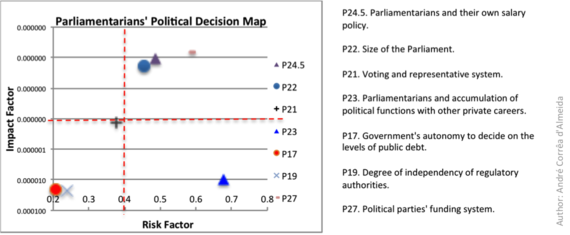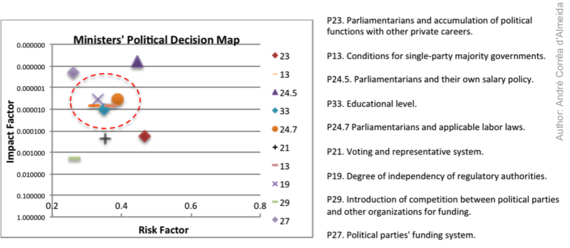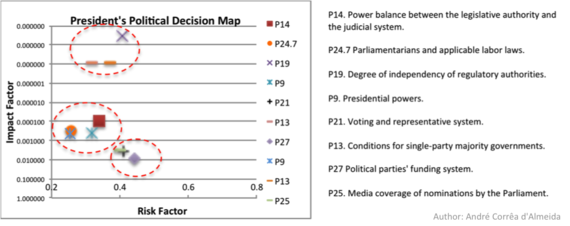A recent survey asked over a thousand Portuguese emigrants, now living in 59 different countries across the globe, to rank their level of trust in Portuguese political actors (e.g., parliamentarians, ministers and the president) (see Figures 1a-1c) as well as other social groups in Portugal, including businesspersons, priests, scientists, family-members, judges, journalists, and social entrepreneurs. The result was that political actors ranked the lowest among all other categories in terms of the level of trust they inspire.
 Levels of trust: 1-minimum; 10-maximum. Parliamentarians (mean=2.50, sd.=1.63); Ministers (mean=2.82, sd.=1.84); President (mean=3.34, sd.=2.31).Source: André Corrêa d'Almeida and Nuno António (2014a)
Levels of trust: 1-minimum; 10-maximum. Parliamentarians (mean=2.50, sd.=1.63); Ministers (mean=2.82, sd.=1.84); President (mean=3.34, sd.=2.31).Source: André Corrêa d'Almeida and Nuno António (2014a)
Disappointingly, though perhaps not surprisingly, voter turnout in Portugal has collapsed from 91.5 percent in 1975, the year of the first democratic elections, to 58.1 percent in the 2011 parliamentary elections. The level of voter turnout in last Sunday's election for the European Parliament was a meager 35 percent in Portugal -- a record low.
This same survey asked respondents to rank a wide range of institutional reforms according to their perceived importance for the development of the country. These responses elicited further investigation into the strategies political actors can follow in order to improve political reputation and prestige, and to reconcile individual political actors' agendas with citizens' collective aspirations. Three distinct strategies emerged, the applications of which varied with respect to each of the three political actors involved.
One of these strategies considers two factors: (i) the impact of alternative institutional reforms on the reputation of politicians; and (ii) the political risk of disenfranchising citizens that do not support those reforms.
As illustrated by Figure 2, the Parliamentarians' Decision Map separates alternative institutional reforms into four groups: (1) high-impact-high-risk, (2) medium-impact-medium-risk, (3) low-impact-low-risk, and (4) low-impact-high-risk. By determining which impact-risk combination best suits their political aspirations, parliamentarians can use this decision map to influence their prestige, prioritize reforms, design political agendas and strategize accordingly. Importantly, this strategy requires that political actors actually ask voters about their preferences.
Figure 2: Risk-Impact Factor Strategy for Parliamentarians Source: André Corrêa d'Almeida and Nuno António (2014b)
Source: André Corrêa d'Almeida and Nuno António (2014b)
The Ministers' Political Decision Map displays a rather different impact-risk pattern of political options as compared to that of parliamentarians (see Figure 3). The most noticeable feature relies on the significantly less linear relationship between political impact and political risk. The key institutional reforms for ministers, vis-à-vis their political prestige, are also different from those of the parliamentarians. Unlike with parliamentarians, the impact-risk cloud seems to contract around a core of political reforms with a medium impact-risk factor.
Outside of this core, and similar to parliamentarians, Ministers have the possibility of incorporating institutional reforms with varied impact-risk combinations into their political agendas and strategies.
Figure 3: Risk-Impact Factor Strategy for Ministers Source: André Corrêa d'Almeida and Nuno António (2014b)
Source: André Corrêa d'Almeida and Nuno António (2014b)
The President's Political Decision Map is less contracted than that of the Ministers at two levels (see Figure 4). First, instead of a core the map clusters around three very distinct groups of institutions. Second, the President's Political Decision Map includes a more diversified set of possible institutional reforms.
Figure 4: Risk-Impact Factor Strategy for the President Source: André Corrêa d'Almeida and Nuno António (2014b)
Source: André Corrêa d'Almeida and Nuno António (2014b)
Naturally, people have different concerns about the ways in which their lives are affected by the socio-economic and political systems in which they live and operate. As such, politicians have a duty to ask better questions -- not just every four years -- and to use proper methodologies to understand the goals of their constituents. Currently, the reputations and credibility of political actors in Portugal is uninspiring, though not hopeless. Politicians can make great strides by simply asking.
In the 2012 U.S. elections, for example, 174 ballot measures were considered by the electorates of 38 states, from the Affordable Care Act to same-sex marriage. Ballot measures, a form of direct democracy, pose questions about specific policies that voters, not politicians, decide. Types of ballot measures include citizen initiatives, popular referenda and initiatives by legislators. In the decade from 2000 to 2010, voters in the U.S. approved 44.9 percent of all ballot initiatives. By contrast, since 1974, Portugal has had only three popular referenda, none of which were approved, since the political system requires a minimum of 50 percent voter turnout to make the results of such a vote binding. Recap: Portugal has had only three referenda in four decades; and none of those referenda successfully rallied the required 50 percent voter turnout.
Political actors should expand the boundaries of their traditionally limited, and often limiting, support base. The expansion of these boundaries should not be based on some pre-conceived ideology, but rather on problem-solving approaches that drive both public satisfaction and political prestige. Political actors need to ask more questions and make use of data-driven methodologies to assess, more effectively, the cost-benefits of their political priorities and agendas.
